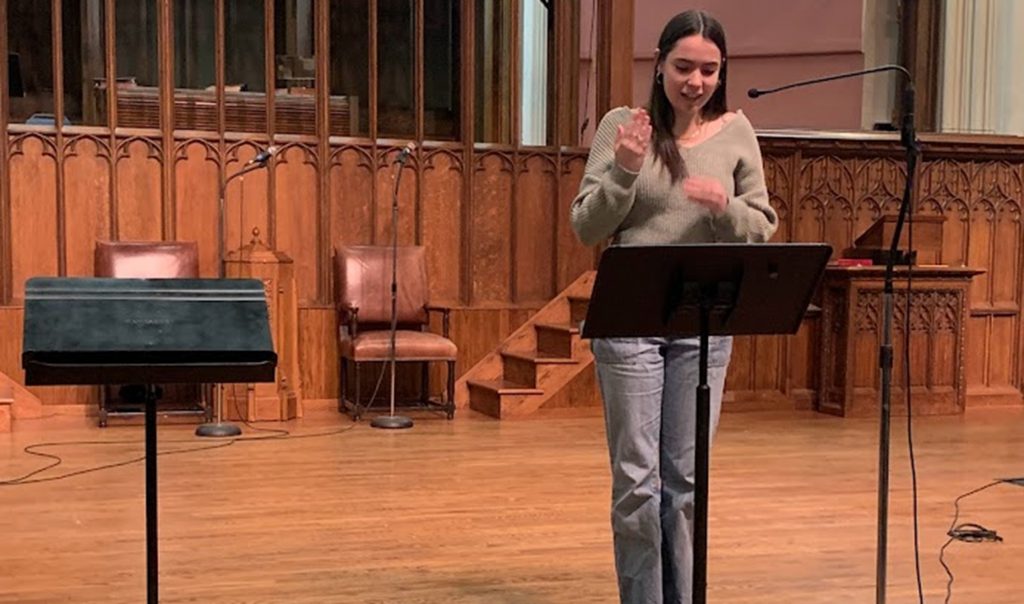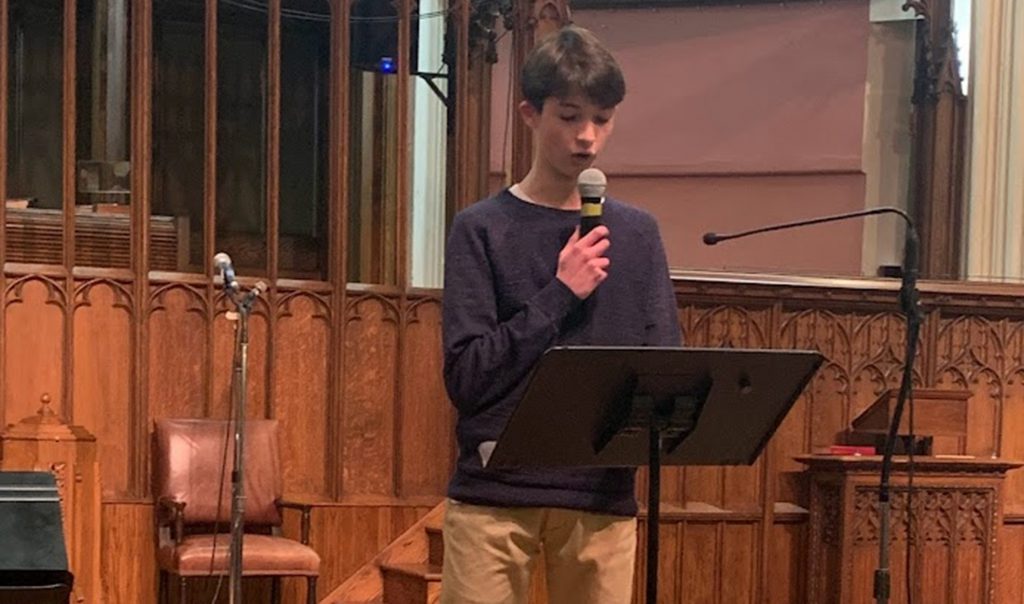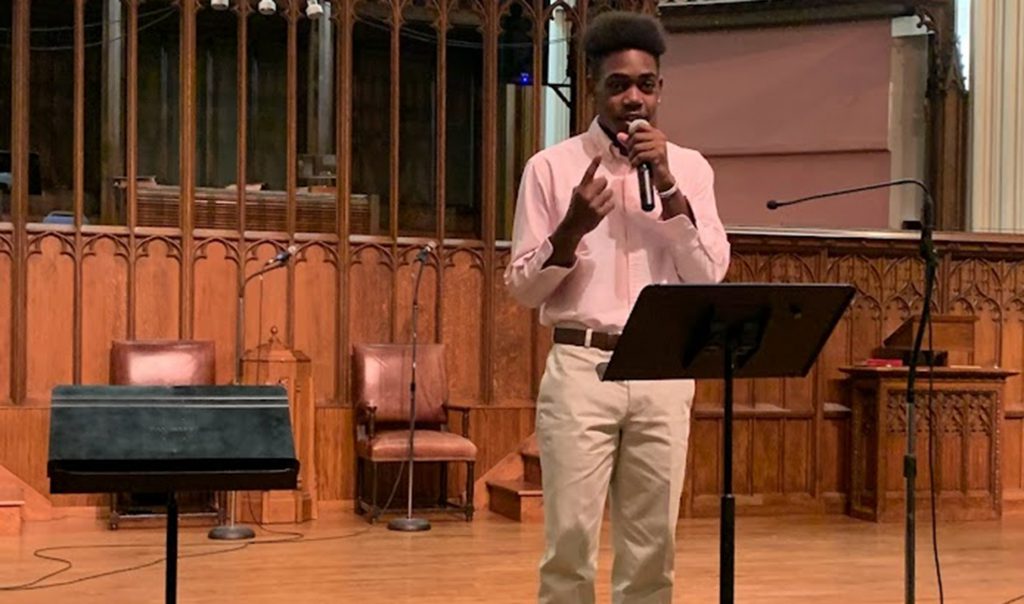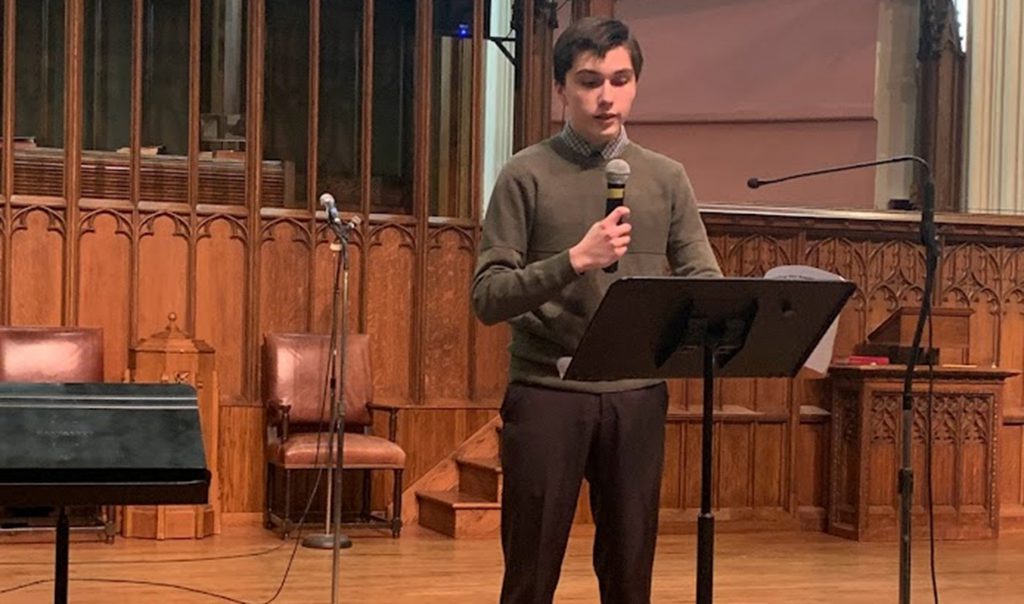Every year, the Glens Falls community holds a special ceremony to honor the life and legacy of Dr. Martin Luther King Jr. This year, the Glens Falls Social Justice Club solicited students from the High School to write and recite original essays and poems to share with the community, describing the impact Dr. King has had on their education and their life.
With the help of teachers Rachelle Gormley, Erin Weaver, and Nicole Matino, five students were identified to share their work for the community to enjoy.
“The organizers for this year’s event were so inspired by all of the local students who present their work,” said Mrs. Gormley. “I am so proud of these kids! They serve as such an inspiration to all.”
Below are the students and their pieces that were shared on Sunday, January 15.

60 Years Ago – written by Kendall Gross, read and signed by Claudette Bricocoli
60 years ago on the steps of the Lincoln Memorial, Dr. Martin Luther King Jr. delivered his unforgettable I have a dream speech to a crowd of over 250,000 people. Even then, as he prepared to make history, he knew the importance of his mission. He addressed the crowd saying, “I am happy to join with you today in what will go down in history as the greatest demonstration for freedom in the history of our nation.” His purpose was one of acceptance, respect, and understanding.
Dr. Martin Luther King Jr. was an incredible trailblazer in the civil rights movement, and used his influence in the church to aid his message of equality for all people. His monumental fight for freedom had inspired thousands of people to join together in peaceful protest against discrimination. Equal opportunity, and the end of injustice were themes throughout his campaign and speech alike.
He spoke of a time in which he dreamed of children gathering together in brotherhood despite the colors of their skin. Black and white children cooperating, because under the view of society, they would be equal. He painted a picture of a time where throughout the country, everyone would understand what was written so many years before, that ALL men were created equal. That their fight for constitutional rights was very necessary to the world, because these rights were what they were promised when they were born as a citizen in America. These rights that were considered inalienable, that were guaranteed to every person in this nation, were being overlooked. Dr. King spoke of a time in which despite the history in the southern states of our nation, white and black individuals would be able to be neighbors, and share respect for one another.
But most prominently in his speech, Dr. King spoke of his hope. It wasn’t guaranteed that the civil rights movement would lead to change in the way people acted, but he was able to dream and hope of a possibility. The possibility of a brighter future in which tolerance and acceptance were the standard for all people. Where people’s struggle was celebrated, and appreciated. One where freedom was something that didn’t need to be fought for, but something that you were simply given. And in which no matter the color of your skin, you were able to receive the same opportunities as others.
60 years ago, a seed of inspiration and hope was planted in the hearts and minds of individuals who were willing to fight in order to make a change. And they did. They fought for what they were promised years ago when pen was put to paper, and the emancipation proclamation was signed. The hope created by Dr. King in his speech spread to every corner of the nation, and hope turned into action. The ideals that Dr. King preached in his speech, acceptance, respect, and understanding between all people. These were ultimately the values that built the foundation of the civil rights movement that had started years before. Without this hope, and without Dr. King’s dream, so much of history would have a different ending.

The King Without a Crown – written and presented by Liam Burgess
A man of peace, a leader bold
His words, a beacon in the cold
A dream of justice, fair and true
His legacy, forever in our view
His march for freedom, a call to arms
His message, a chorus of love and charm
He spoke of equality, for all to share
His vision, a light for us to follow, there
Martin Luther King Jr., a hero true
His spirit lives on, in all we do
We carry on his fight, for justice and peace
His memory, a guiding light, that will never cease.

I Too Have A Dream – written and presented by Duvaney Prince Mills
I too have a dream
That one day
The poor will have enough
to eat and change to spare
Every child has both a
mother and father
And clean water to drink
And the sad and bleak
Who endlessly and solely
write about being sad and
put upon
I too have a dream
That we Can find that certain missing
peace and happiness
To make the whole world
including them
Smile so broadly
even the unfortunate
For just a single second
See the darkened clouds
dissipate
And tunnel and illuminate
Free to love the world at last
outside this pressure cooker
looking glass
Devoid of sadness nullified
By unbridled glee and joy
happy thoughts
Where not only the fittest survive
But every species on earth
thrives
And escape this existential
perpetual nightmare
Its bigger than black and white
There’s a problem with the whole way of life
It can’t change overnight
But we gotta start somewhere
So why not start here

Realigning Our Dream – written and presented by Jack Sweet
Good afternoon, thank you for giving High School students an opportunity to participate in such a special day for our city.
On August 28th, 1963, almost sixty years ago, Martin Luther King Jr. gave his infamous ‘I have a Dream’ speech from the steps of the Lincoln Memorial, in front of a crowd of hundreds of thousands. – Within his speech he outlined his vision of a united country, where the boundaries of race no longer existed. – His location to give such a speech was not random, Abraham Lincoln signed the Emancipation Proclamation a hundred years earlier, freeing all enslaved people within the Southern states. – Both of these men shared a common belief for the freedom and dignity of all men. – DR. King Jr. stood on this memorial recognizing the imperfections of our nation while outlining our collective path forward.
Martin Luther King Jr. sought to end the long standing wicked system of segregation that had robbed Black Americans of their rights, happiness and even their lives for a century after the Civil War. – His leadership was successful and now, sixty years later, we live in a society where people of all colors can co-exist peacefully. – Black schools and white schools have become public schools. Black businesses and white businesses have simply become businesses. – His tireless efforts created these inalienable rights for all men. – Though we have come a long way there is still work to be done.
We have largely neglected fixing a core aspect of our American system, our national memory. – What is a national memory? A national memory is a complicated thing, it is the combined experiences and culture of a country. It is a collective consciousness, a series of shared ideas and memories of our past that we all experience. – National memory largely defines our American story, but it has remained a very fractured memory.
Our shared interpretation of our American History has been challenged by various groups. – These groups create fractures within our national memory, each group touting its own version of historical facts. – This is occurring as we speak.
One such controversial experience is our Independence day, July 4th, which is celebrated in cities and towns across the country. – In our National Memory it symbolizes our birth as a nation and our freedom. – The words “-all men are created equal, that they are endowed by their creator with certain unalienable Rights, that among these are Life, Liberty and the pursuit of Happiness.” are commonly hailed by all as the pinnacle of what America has, however, for eighty-seven years after these famous words were written, over four million people were enslaved.
Our most basic principles did not apply to black Americans before the 1860’s. – Our Independence Day was not celebrated by them, because they were not included. – Fredrick Douglass, a pioneer of rights for Black Americans, said before the Civil War, that “The rich inheritance of justice, liberty and independence, bequeathed by your fathers, is shared by you, not by me.” – This sentiment would change with the outcome of the American Civil War, independence day was then celebrated across the South. – Not by the recently defeated Southern white slave owners, but by the millions of Black Americans who had been liberated.
These celebrations included great parades held annually by all-black regiments of the army, with dance, song and festival by these freedmen. – To the Southerners, independence day belonged to white Americans. – By the end of the 19th century laws were passed by white people to prevent Black Americans from celebrating their independence; food could not be sold and restrictions on festivals were implemented. – What could not be done by law was done by a mob. By 1900 it was white soldiers who paraded through the streets being cheered, void of color. – Those are historical facts, part of the foundation that civil rights were fought from.
Today we have a fractured national memory, a lack of understanding and agreement on common historical facts, beliefs and cultures. – To improve our nation and remove the final vestiges of racism we must acknowledge the truth of OUR history. – America’s historical truth is that our nation was, and still is, imperfect and divided, yet capable of equality and love. – As a nation we can acknowledge our imperfect past, remember and teach it as such, perhaps then DR Martin Luther King Jr’s famous words that “– black boys and black girls will be able to join hands with white boys and white girls as sisters and brothers” will finally be realized. – A shared dream, we will only be able to achieve if we join our fractured national memory into a more perfect union, based on truth and equality.
